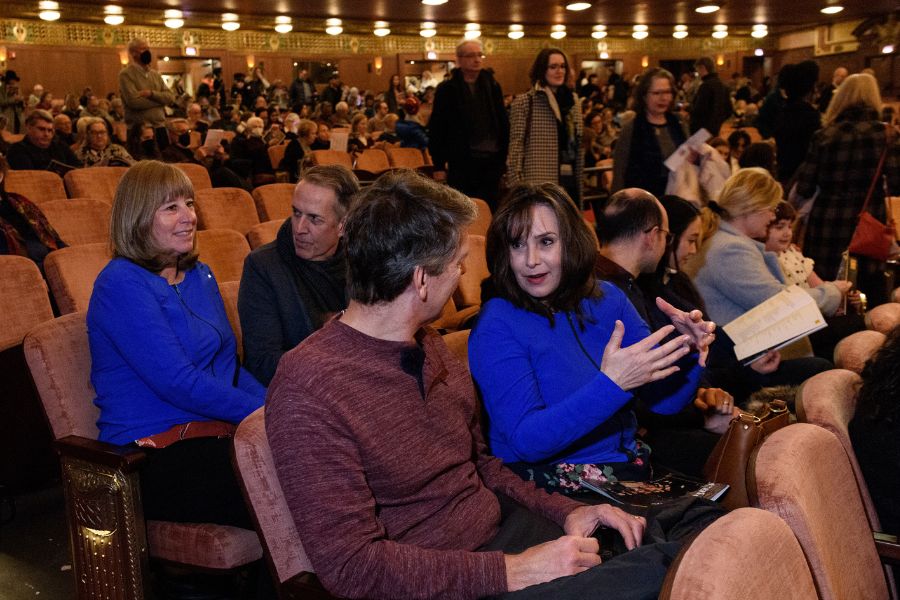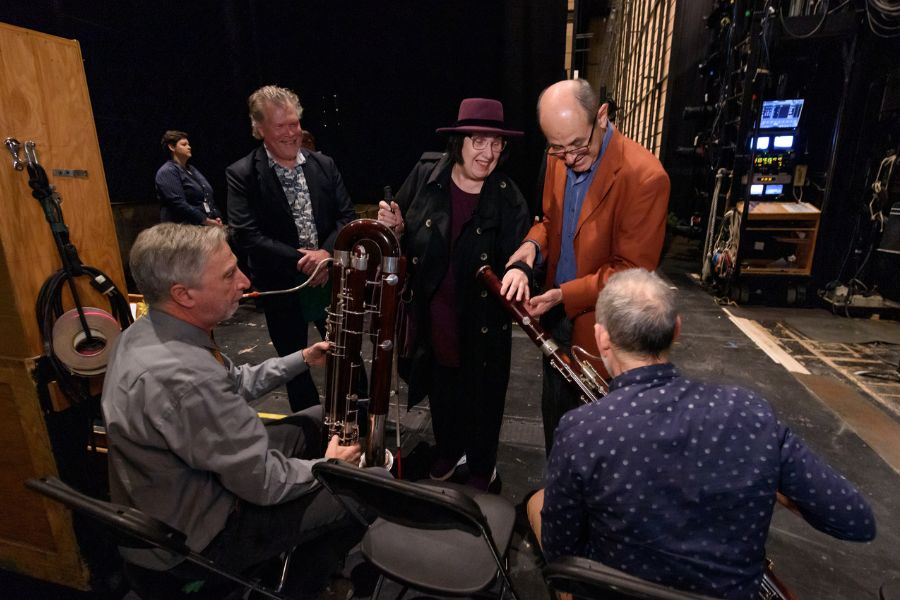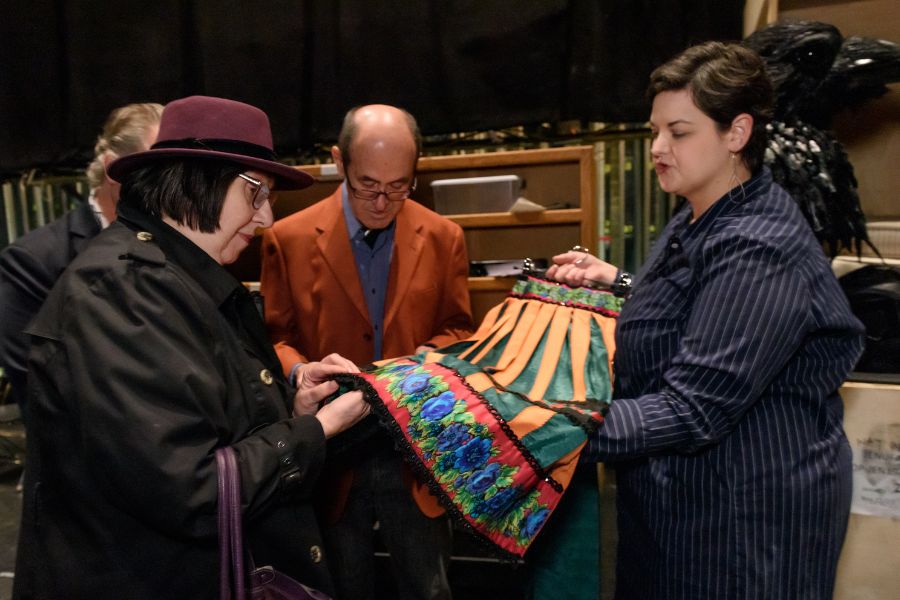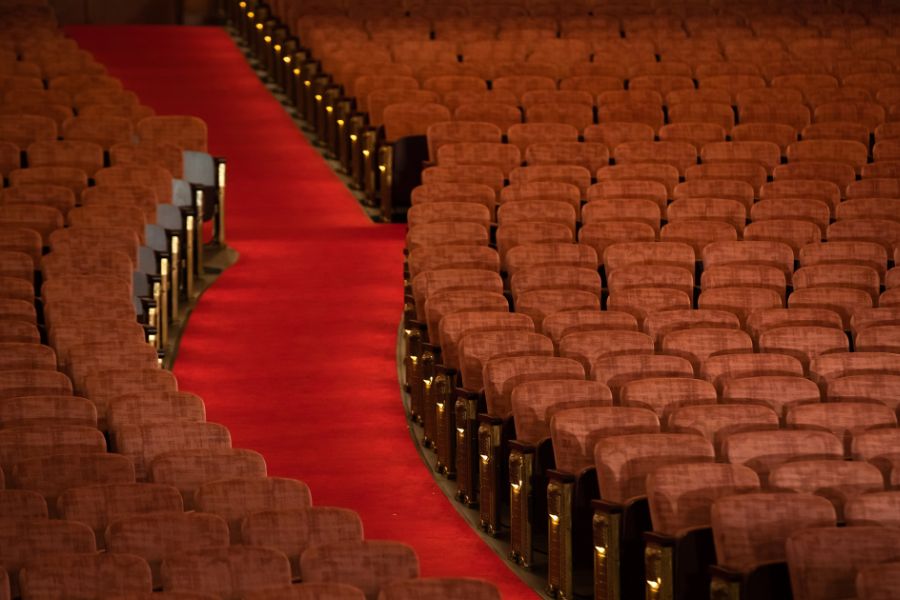December 06, 2024
Tangible Improvements
Lyric continues to implement barrier-breaking initiatives that make the opera experience even more available.
By Casey Bowman
Accessibility is one of the guiding tenets of Lyric Opera of Chicago’s commitment to Inclusion, Diversity, Equity, and Access (IDEA) — and the company strives to define the term broadly. Lyric wants to introduce new audiences to the art form of opera, create work that is recognizable and representative of different communities, and ultimately make it easier for anyone and everyone to enjoy the opera experience.

The blue SoundShirts translate the music onstage into physical sensation.
Among the company’s most prominent and successful recent accessibility initiatives is the SoundShirt project, an innovative garment which provides physical vibrations of the music onstage and from the pit to users in real time. The lightweight zip-up jackets feed audio signals from the orchestra and singers to haptic actuators — similar to those found in mobile phones — that then translate the sound into tangible vibrations across the user’s torso. Lyric Opera of Chicago is the first opera company in the world to bring a tactile experience to audiences who are deaf or hard of hearing.
Created in conjunction with London-based fashion technology firm CuteCircuit, the ongoing program received local and national media attention. In partnership with the City of Chicago’s Mayor’s Office for People with Disabilities, the groundbreaking program was spearheaded by Brad Dunn, Lyric’s Vice President of Marketing & Communications. “What we’re seeking is an enhancement; we’re not re-creating what it’s like to hear music, because you can’t do that for someone who doesn’t have their hearing,” Dunn explains. “But you can create an experience that is unique, that is a thing in and of itself, that layers on top of the audience’s experience of seeing a show. It adds some richness.”

Touch Tours offer up-close encounters with orchestra players and their instruments.
Lyric provides ASL interpreters to select shows sung in English, in addition to audio-described performances for all mainstage productions. FM assistive listening devices also provide amplification of audio, enabling a fuller and more authentic opera experience for hard-of-hearing audience members. In addition, English translations are projected above the stage for all mainstage performances. Audio-described performances are scheduled for each production and include narrations with detailed descriptions of new scenes, settings, costumes, and body language. Audio descriptions are made available to patrons through headphones, and are communicated at appropriate times throughout the performance.
Lyric has found ways to engage the other senses of operagoers as well. House program books are available in large-print and Braille; high-powered opera glasses are also available for those who are blind or have low vision. Touch tours are guided tours that give patrons who are blind or have low vision the opportunity to grow accustomed to the theatre space and feel the magic of productions up close. The experience begins with an overview of the production by an expert interpreter, followed by an exploration of the backstage area. Interactions with orchestra members can provide demonstrations, while costume designers and stage managers can take patrons through the process of set and costume design. In last year’s production of Champion, for example, attendants were able to touch props like the boxing gloves that Emile Griffith, portrayed by Justin Austin, wore throughout the production.

Costume Director Kim Buetzow shares some of her department’s handiwork during a Touch Tour.
In 2020, an anonymous donor’s generosity allowed the Ardis Krainik Theatre to be renovated and redesigned. The overall goal for the project was to improve accessibility — not to mention the benefits of new seats and improved sightlines.
The process was a grand undertaking. Eight concrete trucks weighing more than 55,000 pounds each were loaded in to resculpt and level out the main floors. Wheelchair platforms were designed in collaboration with Staging Concepts, Lyric’s disability platforms manufacturer; the platforms are available at every price range throughout the opera house, and companion seating is provided to ensure the most pleasant viewing experience. Currently, there are 19 movable disability platforms, 11 additional wheelchair fixed locations, and 45 removable aisle seats. In addition, the seats themselves — provided by Series Seating — encourage “active sitting,” which increases blood circulation, reduces back strain, joint stiffness, and muscle strain when sitting for long periods of time. The opera house also has numerous accessible restrooms; elevators that provide access to all above-ground floors; automated exterior doors; and removable aisle-side armrests.

New seating has provided dramatically improved sightlines.
These recent developments are just a few of the many ways in which Lyric continues to cultivate and expand the audience for opera. As inclusive practices and technological developments continually evolve, Lyric too will continue improving how people experience opera. Through engaging with community members and having intentional and purposeful discussions on accessibility — and with the generous support of forward-thinking donors — the company will keep striving to make the art form ever more available.
